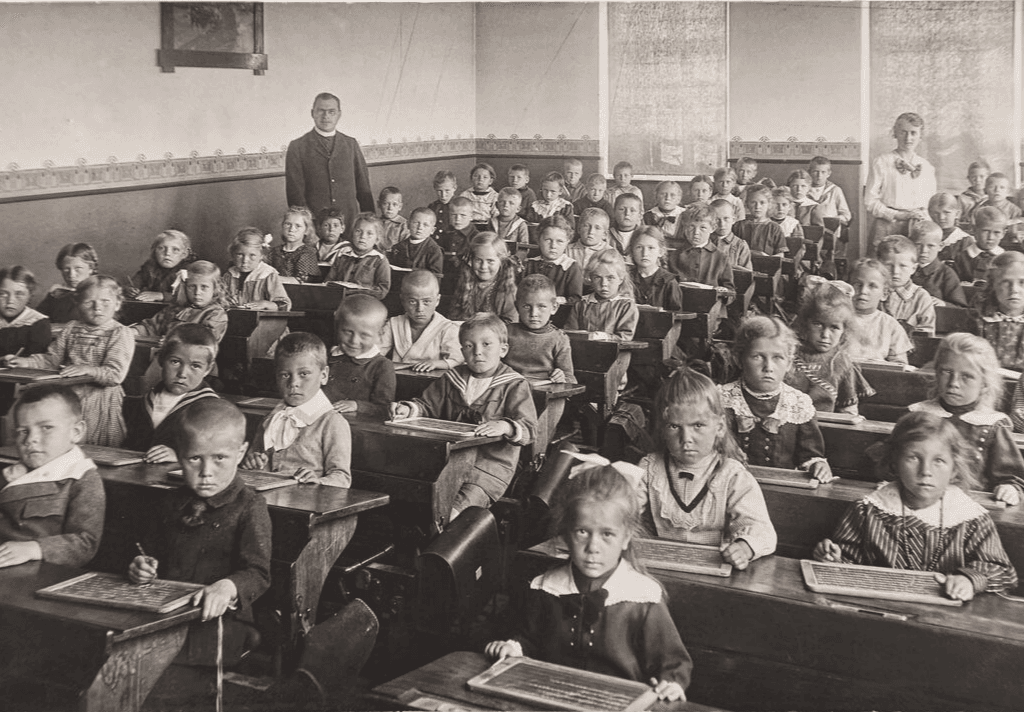Public education shows unity in the United States through the solidarity of social classes and the will to improve social outcomes. By a more forceful technique than not, the unity exists simply because "common schools would not truly serve as a unifying force if private schools drew off substantial numbers of students, resources, and parental support from the most advantaged groups" (Kober 3). This was believed to be the only way to succeed required enough children across all social classes into a system of common schooling. Although not through an organic process, this inclusivity bonds children across the country. With the encouragement for all students to learn at public schools, "the path toward providing universal access to free education was gradual" (Kober 4). Despite the task being slow and unsteady at first, more states accepted the responsibility to include universal free education in their constitutions. With the new moral obligation to hold the standard of public education, the government took on the crucial role to include students from low-minority income families, students with disabilities, students with limited knowledge and application of the English language, and so on. The federal government ensured that "educational equity" would be promoted and provided (Kober 6). Not only was the federal government approaching this situation hand-on, so was Horace Mann. He rode by "horseback from district to district and [reviewed] the actual physical facility" (Mondale 27). Over the course of six years and in one thousand schools, "Mann found a system built on inequity" (Mondale 27). The conditions of schools were unsafe, not to mention the curriculum from which students were learning from was "outdated and irrelevant" (Mondale 28). This unity opens the eyes to the harsh separations of the country, providing hindsight for the future in order to achieve a more equitable school system.
In terms of dividing the country, the most obvious answer would be segregation. Not only between race, but between gender, immigrants, disabled, religion, economic status, etc. Having been underserved for many millennia at the start of our nation, non-white groups "were often underserved or educated in separate schools, by law or by custom" (Kober 5). They redefined the achievement of education to "tie the quest for freedom and the quest for education and excellence together" (Mondale 41-42). Investigation from the school committee to integrate schools based on race took much longer than any other integration process. The committee vowed that "in the case of colored children, we maintain that their peculiar physical, mental, and moral structure requires an educational treatment different from that of white children" (Mondale 43-44). The dismissal of black students based on the color of their skin seemed to have been brought about by the fear that the "competition" against white children would be unmatched, resulting in "sneers, insults, assaults, and jeers" (Mondale 44). Not only was an entire race neglected from the inclusion of public education, but also an entire gender. The idea of "female geniuses" was not even considered a possibility in the mind of Thomas Jefferson (Mondale 24). He concluded that there would be just three years of schooling to teach women how live a married and motherly life. Within the school, girls were taught to sew, "but of course underneath that material would be textbooks" (Mondale 24). Even when public schools opened up for women, "they were sometimes taught a different curriculum from boys and had fewer opportunities for secondary or higher education" (Kober 5). At this point, the only acceptable classification left to become educated were white men. Yet, even within that class, the question of religion raised a big question. Because of the growing number of immigrants, many of the public schools did not teach their religion. With hopes to fight for the inclusion of Catholicism - eventually encouraging others to fight for their own religion - John Hughes challenged the beliefs of Horace Mann. He proclaimed, "We are unwilling to pay taxes for the purpose of destroying our religion in the minds of our children" (Mondale 33). People of other religions felt unsafe attending schools with which their religion was not just unlearned, but disgraced and destroyed by the hands of others.
Currently, school has shaped and defined the lives of the American public based solely on hindsight and accountability. We have learned from our past and bettered ourselves from it. The changes made to our public school system has only helped our society grow, and because of that, we can admit the mistakes we have made. For they have only encouraged a brighter, more equitable, opportunity filled future. In my experience, public education has taught me to be responsible for my own actions, teaching me obedience within my individuality and independence. I have learned from not only the past of American history, but also my past, advancing from grade to grade and excelling at each level.
Works Cited
Kober, Nancy. “History and Evolution of Public Education in the US - Eric.” History and Evolution of Public Education, https://files.eric.ed.gov/fulltext/ED606970.pdf.
Streep, Meryl, et al. School: The Story of American Public Education. Beacon Press, 2006.


